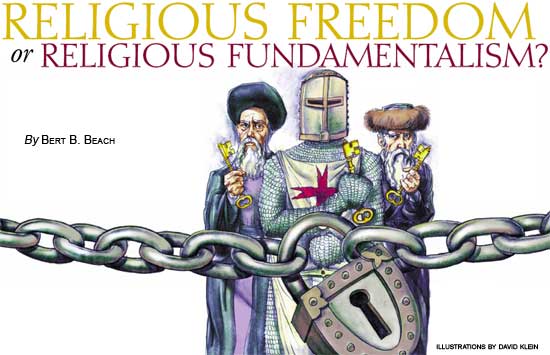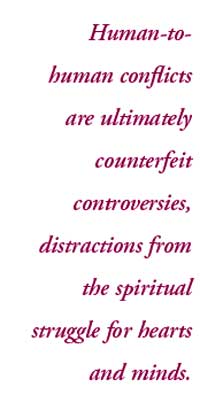Religious Freedom or Religious Fundamentalism?
B. B. Beach January/February 2008
Getting your Trinity Audio player ready...
|
Religious Freedom or Religious Fundamentalism?
By Bert B. Beach  Originally, the term fundamentalism began to be used in the United States in the 1920s. At that time it referred to a traditionalist movement confronting "liberal religion," particularly "higher criticism," heavy concentration on the sociopolitical gospel, and godless evolution. Since then, it has become clear that the term fundamentalism has considerably shifted its denotation. Today, religious fundamentalism has penetrated all major religions, the most obvious being Islam, and has become a dangerous, worldwide phenomenon. It is essentially a reaction, at times violent, against most things "modern," including democracy, and repudiating "secularization." 
Religious fundamentalism is in its essence not a doctrinal issue, but a basic outlook directed toward the current world order, protesting against laissez-faire societies. The resulting protest often becomes vehement, inflexible, pitiless opposition to anything new, and tramples on the human rights of the exponents of different opinions and progressive change. Fundamentalism makes its case not only in the media, but in bloodshed every day—from misguided zealots who blow up abortion clinics in the name of Jesus, to doctrinaire fanatics who blow up peaceful villagers or city dwellers in the name of Allah. Despite all the differences of creed and kind, observers can point to some consistent threads running through the tapestry of fundamentalism: the quest for purity and perfection; the search for absolute certainty, tradition, and authenticity; and the predilection for a total, global worldview that controls, or at least strongly impacts, all aspects of life. The attention it gives to tradition and the past is often an illusory attempt to "restore" that which never was. This false dream characterizes many expressions of fundamentalism. The paradox of the modern world is that while scientific standards are becoming more and more precise and demands for objectivity ring in our ears, moral standards are becoming vaguer, more situational, and increasingly imprecise. The breakdown of traditional morality has been followed by growing social permissiveness. The economic and cultural exploitation of Third World countries and segments of society in Western countries is a reality. Fundamentalists, with some reason, are protesting. One key reason for the growth of contemporary fundamentalism is marginalization. This occurs when any group—by race, ethnicity, language, religion, or economic status—is made to feel irrelevant to decision-making and feels excluded from participation in society. This is increasingly the case with the poor in today's world. The speed of travel and almost instant worldwide communication have placed the poverty, misery, and unequal social structures of whole groups of people in close proximity to wealth and special privilege. Fundamentalism can then become attractive as a form of protest by those who feel hopelessly marginalized and exploited. An increasing number of people groups feel "out of the loop." Having won independence and nationhood, many citizens of younger nation states hunger for the esteem they believed would come with national identity. They feel humiliated by economic, cultural, and occasionally military hegemony exerted over them by more powerful states. The resentment of the marginalized may well be the most prolific breeding stable for fundamentalism, and tends to push back religious liberty. It would appear that many religious fundamentalists view a human rights-oriented secular nation as both a danger and a failure. It has not achieved social justice, they say. It has not provided family stability, sobriety, respect, and honor. Often the result, or at least the reality, of secular national government appears to be greatly increased crime and divorce rates, drug culture, pornography, homosexuality, and rampant corruption in business and political life. With this in mind, for the fundamentalist, religious liberty and political democracy become of little importance—nonessential luxuries. Although we might agree with some of the fundamentalist critique, I believe that their "medicine" is worse than the "sickness." There is, as already indicated, an element of mythology and historical blindness in the fundamentalist thinking and solution. While its adherents are basically against change, they do favor one selected change: going back to the "golden age" of tradition and perfection. This "going back" can vary a great deal: fundamentalist Muslims want to go back about a thousand years; for Christians, "going back" can vary greatly—to the nineteenth century, to the so-called united Christendom of the Middle Ages, to the time of the Church Fathers, or to the first century. Some fundamentalist Jews dream of the past theocratic period and temple. Fundamentalists seek in their own various ways to "traditionalize," to go back to the past—the theology of the pioneers, the legendary heroism of the Teutonic knights, the fortitude of the Voortrekkers in South Africa, the firmness and rectitude of the Puritans in North America. Many fundamentalists seek one major reactive change: they want to place their religious views at the center of life in the home, government, courts, media, schools, even the military—in short, everywhere. Thus, religious fundamentalists today have both backward-looking worldviews and a present mind-set. There seems to be in religious fundamentalism an almost inevitable progression (though probably "regression" might be a more accurate term) toward religious extremism, disregard of human rights and religious liberty, and ending up in totalitarian alliance of religion and state. Fundamentalism does have its complexities and paradoxes. Fundamentalists can very well hate and fight other fundamentalists. That is part of the picture. While many believers may share with fundamentalists a "high view"of scripture, most do not share their tendency to quote their scripture selectively—be it the Torah, the Bible, or the Koran. Fundamentalists often use an out-of-context proof-text approach. Many devout fundamentalists, without much reflection, take passages and apply them simplistically, without seeing the entire perspective, to very different present-day situations. Some fundamentalists even rationalize extreme interpretations of their scriptures in order to justify the suppression of other opinions, to support violence and terror, and proclaim the "glory of suicide martyrdom" that kills innocent people.  The fundamentalist mind-set is, finally, unacceptable because it is in conflict with the dignity of the human person, a free moral agent with the right to be committed to his or her beliefs and convictions. There is often in fundamentalism a built-in resistance to freedom, reason, learning, and creativity. It forgets that God gave us all these gifts. Fundamentalism, wherever found, reveals its taste for bigotry, fanaticism, rigidity, and exclusiveness at a time when the world is crying out for bridge-builders and peacemakers. It revels in control, and justifies its refusal to dialogue and learn by its suspicions of other opinions and other faiths. I must reject religious fundamentalism because it feeds religious hatred and starves religious freedom. Dr. B.B. Beach is secretary-general emeritus of the International Religious Liberty Association. This article is based on a speech he gave in February 2007 at a world conference in Cape Town, South Africa. Elements of that same speech also appeared as articles in the Adventist Review and Fides et Libertas (see accompanying feature in this issue). Article Author: B. B. Beach
test for sheldon
|


